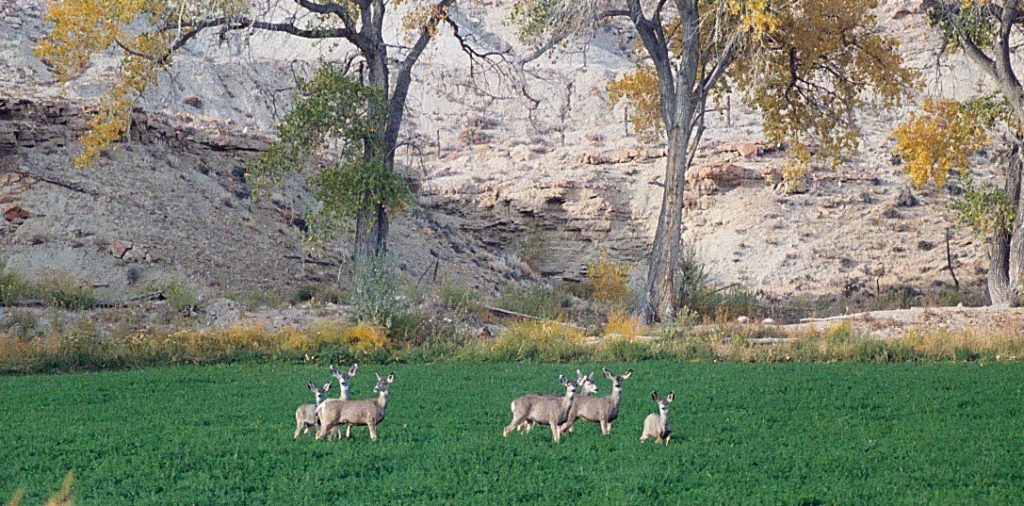
Deer feed in a farmer’s alfalfa field in Huntington Canyon. Depredation is an on-going challenge for farmers, ranchers and the Division of Wildlife Resources.
NORTH LOGAN — The Utah Division of Wildlife Resources wants the public to know about an ongoing program where anyone experiencing economic difficulties can sign up to receive wild game meat throughout Utah.

“This program has been in effect for several decades as a way to use the meat from wild animals that are euthanized to help reduce conflicts with ranchers and farmers in rural areas,” said DWR spokesperson Faith Jolley. “Wildlife, such as elk and deer, can cause property damage and economic hardship to ranchers and farmers by grazing on their hay fields or crops.”
She said when these conflicts occur within town limits, on private land or outside of a hunting season, hunters cannot legally harvest these animals.
In some cases, DWR employees respond to these incidents and remove the wildlife.
“There are two separate programs: The meat donation program is administered by DWR and people sign up on the form on our website,” Jolley said. “The urban deer program is authorized by us, but administered by the cities.”
North Logan is still enrolled in the urban deer program, per our contract, but isn’t going to participate this year because of budget concerns.
In Cache Valley, North Park Animal Control works on the deer populations in North Logan and Hyde Park cities. Both cities have DWR permits to harvest deer. Until recently, North Park had Animal Control Officer Nolan Krebs remove skunks, raccoons, rattle snakes and other animal problems, including deer issues.
“We started a deer management program five years ago,” Krebs said. “We got a permit from DWR to thin the deer population in the two cities.”
His permit gave permission to harvest 40 deer a year from both cities.

“We trapped them at first then we took them to remote places and let them loose. They all died,” he said. “Then we tried taking them to closer places like Bear Lake and Black Smith Fork and 50 percent of them died and the rest came back.”
Capturing the deer and transporting them was costly for the cities.
“We decided to dispatch the deer to save money for the city. I would take them and dress them out,” he said. “Then we would offer the meat to the public. We sent out a letter to the citizens to call me and I made a list.”
When he had meat to offer, he called the people on the list.
“We did try to give the meat to people who need it the most or who live on it,” he said. “And then we have people that just wanted it.”
He had up to 120 people annually signed up.
“We used to harvest the deer from October to December. DWR changed that to August 1 to October 15,” he said. “It made it harder to capture the deer.”
He said both cities have new elected officials and they are evaluating the program.
“This year we are not going to take any deer. They stopped the program,” he said. “I have had people already call me for deer meat and I have had to let them know there might not be any.”
Krebs said he expects the deer population to double by next year.
“We were averaging 30 to 35 auto deer accidents a year before we started thinning out the deer population,” he said. “We have reduced the deer car crashes up to this point, but as the population increases so will the auto/deer crashes.”
He said the deer can also be dangerous and attack people.
“We’ve had three people attacked by deer, especially does when they have fawns,” Krebs said. “I’ve been hit with their front hooves, it can hurt. Then they try and knock you down and stomp you.”
He said another problem deer cause when they come down to the populated areas is they also attract cougars from the mountains.
Cache Valley residents may have to call DWR to get their deer populations under control.

“We don’t want to see this valuable food resource go to waste, so we donate the meat from these animals to locals who may be in need,” DWR Wildlife Coordinator Chad Wilson said. “Because COVID-19 has impacted so many Utahns economically, we wanted to make sure the public was aware of this program and can use it, if needed.
“When it is necessary for us to euthanize wildlife, it is important that we don’t let the meat go to waste. We are glad that this valuable resource can benefit Utahns and their families who may be struggling during these difficult times.”
Participants in the program should also note that the removal efforts often take place during the night, and those who sign up for the donated meat should be prepared to pick up the animal and either store it or process it on short notice.

